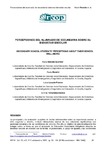Percepciones del alumnado de secundaria sobre su bienestar escolar

View/
Use this link to cite
http://hdl.handle.net/2183/38666Collections
- Investigación (FEDU) [938]
Metadata
Show full item recordTitle
Percepciones del alumnado de secundaria sobre su bienestar escolarAlternative Title(s)
Secondary school students’ perceptions about their school well-beingDate
2022Citation
Rebollo-Quintela, N., Mendiri, P., Losada-Puente, L., & Fernández-Blanco, A. (2022). Percepciones del alumnado de secundaria sobre su bienestar escolar. REOP - Revista Española de Orientación y Psicopedagogía, 33(2), 85–101. https://doi.org/10.5944/reop.vol.33.num.2.2022.34361
Abstract
[Resumen] La percepción y la evaluación subjetiva de los/las adolescentes sobre su experiencia escolar, a nivel cognitivo y afectivo, incluye valoraciones acerca de sus relaciones significativas con personas cercanas y de las condiciones del entorno. Por ello, el objetivo de esta investigación fue indagar sobre la forma en que el alumnado de Educación Secundaria Obligatoria describe su bienestar escolar en relación con la familia, el profesorado, el grupo de iguales y las condiciones de los centros educativos. Se realizó un estudio cualitativo, a través del método fenomenológico, aplicando un cuestionario abierto diseñado ad hoc, a 510 alumnos/as. La información se codificó y analizó a través de la herramienta MaxQDA Pro-2020. Los resultados evidenciaron que el bienestar escolar del alumnado está estrechamente ligado al apoyo e implicación familiar en las cuestiones escolares y personales, a la figura de un/a docente cercano/a y empático/a, a actitudes de sus compañeros/as caracterizadas por el respeto y a unas condiciones escolares favorables en términos de infraestructuras, servicios y normativa escolar. Además, reclamaron una mayor autonomía y participación en la toma de decisiones. En definitiva, es clave escuchar las preocupaciones y experiencias del alumnado ya que permite diseñar líneas de actuación a incorporar en los planes del centro, que tengan en cuenta las sugerencias del propio alumnado para la configuración de espacios educativos que generen bienestar. [Abstract] Teenagers’ subjective perception and evaluation of their school experience, at a cognitive and
affective level, includes their assessment on significant relationships with close people and on
environmental conditions. Therefore, the aim of this research was to inquire into the way in which
high school students describe their school well-being in relation to their family, teachers, peer
group and school conditions. A qualitative study was carried out, using the phenomenological
approach. An open ad-hoc questionnaire was administered to 510 students. The information was
coded and analyzed using MaxQDA Pro 2020. The results showed that the students’ school well being is closely linked to the support and involvement of the family in school and personal
students’ matters, to the figure of a close and empathetic teacher, to the attitudes of their peers
characterized by respect, and to favorable school conditions in terms of infrastructure, services,
and school regulations. In addition, students demanded greater autonomy and participation in
decision-making. In conclusion, it is essential to listen to the students’ concerns and experiences,
to design educational spaces that consider their suggestions and generate well-being at school.
Keywords
Orientación educativa
Bienestar del estudiante
Ambiente educacional
Participación estudiantil
Escuela secundaria
Educational guidance
Student well-being
Educational environment
Student participation
Secondary schools
Bienestar del estudiante
Ambiente educacional
Participación estudiantil
Escuela secundaria
Educational guidance
Student well-being
Educational environment
Student participation
Secondary schools
Editor version
Rights
Atribución-NoComercial 3.0 España






